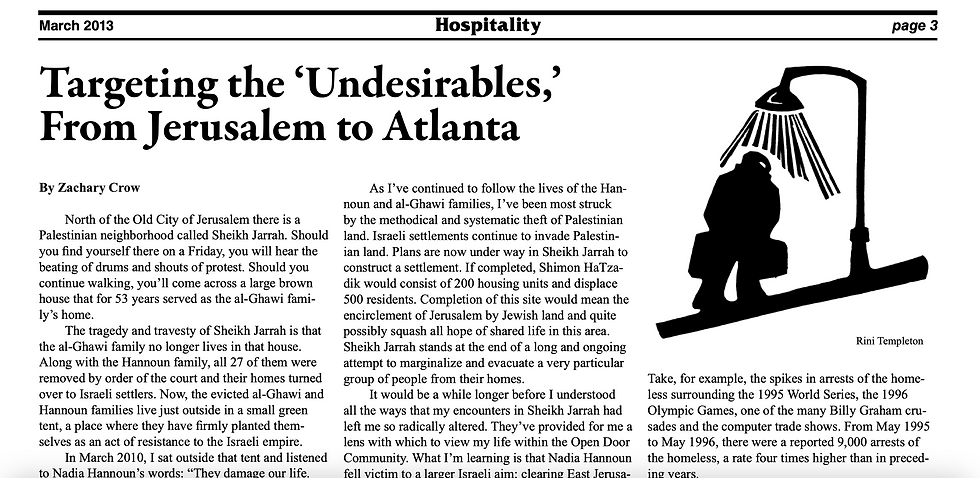Footwashing as We Stare Down Death
- Zachary Crow
- Apr 1, 2013
- 4 min read
Updated: Feb 19, 2025
Read Online at Open Door's Website
The table was set. The food was ready. The guests had arrived. Lazarus, dead only a chapter earlier, now reclined at the table. Word of Lazarus’ revivification had made its way to the chief priests and Pharisees, who had now begun plotting to kill Jesus. This party, held in Christ’s honor, was set against a dangerous backdrop.
Mary and Martha were there as well. As he was so often inclined to do, in a miraculous showing of inclusivity, Jesus ate with women and the unclean. It was as great a showing of Christ’s unkingdom as one might find; Jesus, without a word, dismantling oppressive purity codes.
Later in the evening, Mary took a bottle of fine perfume and poured it over Christ’s feet. The last time he had been with her and Martha, the smell of death had been in the air, but now the smell of perfume filled the house. The nard that Mary used had most likely been imported from India and cost well over a year’s wages.
No wonder the disciples responded with such distress at the seeming waste. It was a grand showing of excess, the contents emptied to the final drop. Women were not supposed to be this close to men or let down their hair in public, but in a magnificent act of defiance, Mary lowered her head and with her hair dried Jesus’ feet. To call it anything but scandalous misses the intimacy and prophetic nature of the act.
In John’s account, it is Judas who vocalizes the question that we, the readers, are asking and calls even more attention to Mary’s extravagance: “Why wasn’t this perfume sold and the money given to the poor?”It’s a question I myself would have asked. And then Christ, in response to Judas, the disciples, and me, tells us: “The poor will always be among you.”
Yes, the poor will always be among us because we are always to be among the poor. What Judas fails to recognize is that the poor are not to be an object of charity but rather an integrated part of the discipleship community. Furthermore, Christ’s statement likely goes back to Deuteronomy 15 and perhaps the Hebrew notion that acts of kindness can be extended to both the living and the dead. John’s further insistence that Judas does not care for the poor in actuality seems to further imply the necessity of this act by us.
Christ then validates Mary’s actions by saying that she is preparing his body for burial, putting her at odds with Judas. While Mary honors the dead, Judas brings the death about. She had fully entered Christ’s climactic nonviolent march to the cross. It’s debatable whether Mary understood the true significance of her action or whether she was the only one in Christ’s inner circle who did, but either way, she began a chain of events that culminated at the cross.
Five days later, as Jesus washes his disciples’ feet, this act of care from Mary is there, simmering beneath the surface, crying out from the subtext.
Perhaps this was Christ’s final insistence that to follow him meant death. His message is plain: to be a disciple is to give up one’s life. What we see at that final supper is Jesus inaugurating a Beloved Community, a place and a people who will prepare and support one another for that task. To wash one’s feet is a dangerous task, an act of solidarity with one another as we stare down death.
Passover is approaching, and the people are speculating as to whether or not Jesus, wanted by the state, will show himself in the temple or at the feast. Instead, five days later, he assembles his disciples in an upper room. While the people take part in ritual sacrifice and purification, Christ ties a towel around his waist and washes his disciples’ feet. It is Peter who denies Christ’s attempt. He is not yet ready to have his feet washed, and even upon submission, he does not understand its meaning.
It is in this moment that I most resonate with Peter, unwilling to take up my cross, unprepared for where following Jesus will lead. It is one thing to follow in the dust of your rabbi. It is another thing altogether to follow him into the grave, and although there is a gravity in the Christian tradition bending toward resurrection, let us not forget the atrocity of Good Friday or the despair of Holy Saturday.
Every time the Open Door Community participates in worship at Dayspring Farm, we engage in the sacrament of footwashing. At the end of a long line of martyrs, we sit in a circle and wash one another’s feet. We are quite a ragtag bunch, struggling to stand alongside Mary and, more often than not, fumbling alongside Peter, unready and unprepared to face the risk and consequences of this radical alternative. And so we wash one another’s feet not out of pious humility, but as a sign of solidarity, hoping that as Christ prepared Peter for the place he was not yet ready to go, he will do the same for us.
We wash one another’s feet knowing that to follow Jesus is to die: to self, to Empire, and quite possibly at the hands of Empire. Yet we do these things, living into the joy that Christ promises: “Now that you know these things, you will be blessed if you do them. Now that I have washed your feet, go and wash one another’s feet.”
Zachary Crow is a Resident Volunteer at the Open Door Community.



Comments